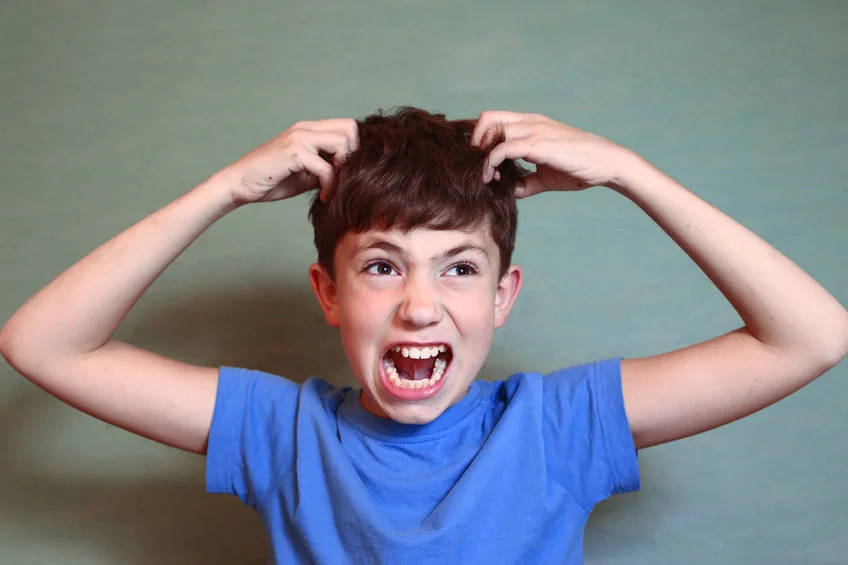How do I know if my child has lice?
Check your child’s hair for evidence of lice or their nits, click here for facts on how to do that. A visual inspection of the scalp is most effective in detecting head lice. Part the hair in small sections and carefully go through each section. It is recommended that you obtain a quality lice removal comb with metal teeth that is specially designed for the detection and removal of lice and nits. We recommend the Terminator Comb. Or, you could "relax, let us take it from here" and schedule a head check.
YIKES! My child has been sent home from school with lice. What should I do?
First things first, don’t panic. While you may have the urge to pick every nit ASAP, take a deep breath, by the time your child shows symptoms of lice they’ve likely had lice for a couple of weeks. All family members of the child should be checked for lice. Relax, let us take it from here, give us a call or schedule a treatment service online.
I found evidence of lice, what do I need to do to my house?
Lice depend on human blood for survival. A louse separated from its human host will rarely survive more than 24 hours. Therefore the majority of your effort should be spent on removing lice from your child’s head. All family members of the child should be checked for lice. As for the home, wash the child’s bed linens and clothes they wore that day & put the hair brush in the freezer.
But don’t I need to clean my house to get rid of all the lice? I’ve heard that I should clean carpets, drapes and take away toys for at least a week.
Lice depend on human blood for survival. A louse separated from its human host will rarely survive more than 24 hours. In fact, after 12 hours of not feeding, a louse has lost its ability to ever feed again. Therefore the majority of your effort should be spent on removing lice from your child’s head. As for the home, all that is needed is to wash the child’s bed linens, hair brush, and clothes they wore that day. There’s no need to take toys or stuffed animals away from children. If vacuuming carpets and washing your drapes will give you peace of mind, go for it, but lice do not live off the head. If you don’t believe us check out this study.
Why do I need to schedule a head check? The nurse/doctor diagnosed my child with lice.
Pseudo-nits are commonly misdiagnosed as head lice . Nits are easily confused with things like dandruff, dirt or even drops of hairspray. Our experts are trained to spot the difference. And, a head check may save you time and money in the long run. https://www.ncbi.nlm.nih.gov/pmc/articles/PMC3680590/
Are head lice a health concern for my children?
Head lice pose no immediate health risk and are not known to spread disease. For the most part, head lice themselves are just an irritating problem. While in some cases their saliva can produce an allergic reaction (causing itching) in some individuals, these reactions are usually mild compared to the risk involved with many chemical shampoo products. Other side effects can include swollen lymph nodes, dark circles under the eyes & a rash on the neck.
How do I prevent my child from getting lice in the first place?
The number one method of prevention is to do once-a-week head lice checks with a quality lice and nit removal comb. The Terminator Comb is the best comb on the market & the best to check with. It only takes a few minutes per person to check for lice. Catching lice early is key to stopping the spread. Long hair should be kept in braids or buns. And, finally, lice really dislike mint, we recommend using a mint spritz daily and shampooing with a mint based shampoo weekly.
I’ve heard that some of the over-the-counter treatments don’t work, is this true?
There are no over-the-counter or prescription treatments to kill lice that are totally safe and scientifically proven to be 100% effective against head lice and nits. When it comes to lice, we need to be 100%. The over-the-counter treatments contain chemical insecticides and can be harmful when applied too heavily or too often. Additionally, the ongoing use of lice treatments' chemical insecticides have made head lice resistant to over-the-counter lice treatment chemicals. Click here for more information.
What about prescription medication treatments for head lice?
Prescription medications for the treatment of lice can be dangerous and we recommend they not be used. The long term side effects of many of these medications are unknown. There is increasing concern and research demonstrating that patients weighing less than 100 pounds, the elderly and babies may be more susceptible to deleterious side effects. A list of the prescription medications and potential side effects can be found at http://www.cdc.gov/parasites/lice/head/treatment.html#rx.
Products containing Lindane have caused the greatest concerns. Exposure to the neurotoxic product has been linked to seizures, developmental disabilities, hormone disruption and cancer. Many states, including California, New York, and Michigan have prohibited the use of Lindane. Unfortunately, Minnesota is not one of these states.

